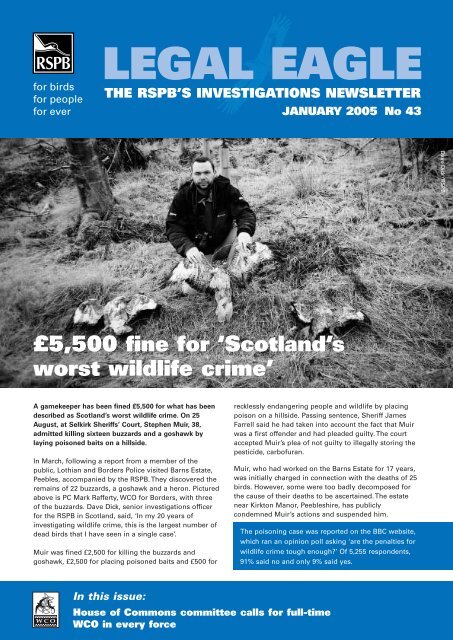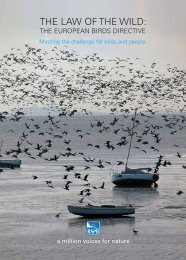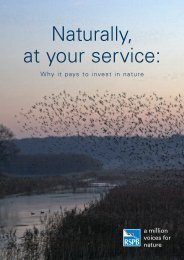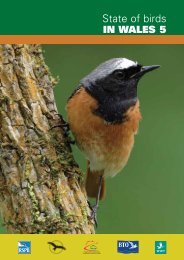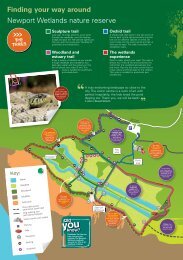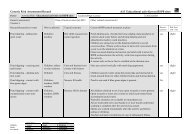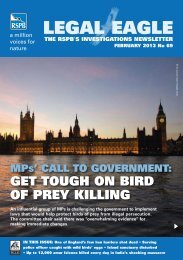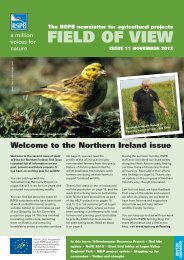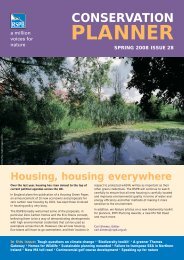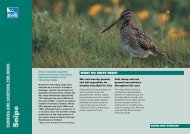Legal eagle 43 - RSPB
Legal eagle 43 - RSPB
Legal eagle 43 - RSPB
Create successful ePaper yourself
Turn your PDF publications into a flip-book with our unique Google optimized e-Paper software.
LEGAL EAGLE<br />
THE <strong>RSPB</strong>’S INVESTIGATIONS NEWSLETTER<br />
JANUARY 2005 No <strong>43</strong><br />
Dave Dick (<strong>RSPB</strong>)<br />
£5,500 fine for ‘Scotland’s<br />
worst wildlife crime’<br />
A gamekeeper has been fined £5,500 for what has been<br />
described as Scotland’s worst wildlife crime. On 25<br />
August, at Selkirk Sheriffs’ Court, Stephen Muir, 38,<br />
admitted killing sixteen buzzards and a goshawk by<br />
laying poisoned baits on a hillside.<br />
In March, following a report from a member of the<br />
public, Lothian and Borders Police visited Barns Estate,<br />
Peebles, accompanied by the <strong>RSPB</strong>. They discovered the<br />
remains of 22 buzzards, a goshawk and a heron. Pictured<br />
above is PC Mark Rafferty, WCO for Borders, with three<br />
of the buzzards. Dave Dick, senior investigations officer<br />
for the <strong>RSPB</strong> in Scotland, said, ‘In my 20 years of<br />
investigating wildlife crime, this is the largest number of<br />
dead birds that I have seen in a single case’.<br />
Muir was fined £2,500 for killing the buzzards and<br />
goshawk, £2,500 for placing poisoned baits and £500 for<br />
recklessly endangering people and wildlife by placing<br />
poison on a hillside. Passing sentence, Sheriff James<br />
Farrell said he had taken into account the fact that Muir<br />
was a first offender and had pleaded guilty. The court<br />
accepted Muir’s plea of not guilty to illegally storing the<br />
pesticide, carbofuran.<br />
Muir, who had worked on the Barns Estate for 17 years,<br />
was initially charged in connection with the deaths of 25<br />
birds. However, some were too badly decomposed for<br />
the cause of their deaths to be ascertained. The estate<br />
near Kirkton Manor, Peebleshire, has publicly<br />
condemned Muir’s actions and suspended him.<br />
The poisoning case was reported on the BBC website,<br />
which ran an opinion poll asking ‘are the penalties for<br />
wildlife crime tough enough?’ Of 5,255 respondents,<br />
91% said no and only 9% said yes.<br />
In this issue:<br />
House of Commons committee calls for full-time<br />
WCO in every force
LEGAL UPDATE<br />
In October, the House of Commons<br />
Environmental Audit Committee<br />
published its findings on wildlife<br />
crime after taking evidence from<br />
the <strong>RSPB</strong>, Defra, police and other<br />
agencies. The report highlights the<br />
failure of the Government and<br />
police to recognise wildlife crime,<br />
stating, ‘we see this refusal to<br />
accept wildlife crime as an issue<br />
deserving of committed police<br />
resources as especially<br />
short-sighted…’.<br />
The Home Office’s failure to show<br />
commitment to fighting wildlife<br />
crime is highlighted; the report calls<br />
upon the Ministry to ‘re-engage<br />
with wildlife crime’ and asks the<br />
Government to restate its<br />
commitment to tackling the issue.<br />
Among the report’s 41<br />
recommendations are calls for:<br />
●<br />
House of Commons committee calls<br />
for full-time WCO in every force<br />
the Government (Defra and the<br />
Home Office) to improve the<br />
recording and investigation of<br />
wildlife crime<br />
●<br />
●<br />
all police forces to appoint a fulltime<br />
wildlife crime officer (WCO)<br />
Defra to table improved<br />
legislation, including<br />
amendments to the Wildlife and<br />
Countryside Act 1981, a new<br />
marine bill and an update to<br />
the Control of Trade in<br />
Endangered Species<br />
(Enforcement) Regulations.<br />
It concludes with the statement,<br />
‘We believe that the link between<br />
wildlife crime and other serious<br />
crimes, the clear and growing<br />
involvement of organised crime,<br />
and the increased reliance on the<br />
internet for illegal trade in protected<br />
species, makes the argument for<br />
spending time and resources on<br />
this area of crime compelling’.<br />
The <strong>RSPB</strong> calls upon the Government<br />
to enact the recommendations in full at<br />
the earliest opportunity. This would<br />
make a significant difference to many<br />
of the problems that face wildlife law<br />
enforcement and that are regularly<br />
highlighted by WCOs, PAW, the <strong>RSPB</strong><br />
and others.<br />
To view the report, visit www.parliament.the-stationery-office.co.uk<br />
(click ‘House of Commons’ then, ‘House of Commons Publications on the<br />
Internet’ and then ‘Select Committee Publications’, ‘Environmental Audit’).<br />
istockphoto.com<br />
PROSECUTIONS<br />
Gamekeeper and employer plead guilty to pesticide offences<br />
On 16 August, at Shrewsbury Crown Court, John<br />
Frederick Twist, gamekeeper for the Marrington Shoot<br />
near Chirbury in Shropshire, pleaded guilty to two<br />
offences contrary to the Food and Environment<br />
Protection Act 1985.<br />
A police search, led by West Mercia WCO Robert Fryer<br />
and assisted by the <strong>RSPB</strong>, revealed a number of<br />
pesticides, including Cymag and Talunex. These fumigant<br />
pesticides emit toxic gases (hydrogen cyanide and<br />
phosphine respectively) when in contact with moisture.<br />
They were found stored on a shelf in an unmarked<br />
wooden shed after Twist had denied storing any<br />
pesticides at this location.<br />
The brand of Cymag was no longer approved for use,<br />
and both pesticides were stored in unsafe conditions.<br />
Fumigants of this nature should be stored in a suitable<br />
fire-resistant cabinet, labelled to show the presence of<br />
gassing compounds, in an appropriate pesticide store.<br />
The shed was unsuitable for pesticide storage and there<br />
were no warning signs.<br />
Twist was employed by a shooting syndicate, and<br />
enquiries established that no Control of Substances<br />
Hazardous to Health (COSHH) assessment had been<br />
prepared in relation to pesticides – although this is a<br />
legal requirement for employers. It appeared that there<br />
had been no system to make sure that pesticides were<br />
properly used and stored during Twist’s employment.<br />
The approved brand of Cymag, manufactured by Sorex,<br />
is currently under revocation; possession of the product<br />
after 31 December will be unlawful.<br />
Twist was fined £500 and one of his employers, John<br />
Wilde, from Kenley in Shropshire, pleaded guilty to two<br />
charges. These related to failing to provide appropriate<br />
instruction, training and guidance for pesticide storage,<br />
as well as permitting the unsafe storage of Talunex.<br />
Wilde received a12-month conditional discharge and<br />
costs of £330. No evidence was offered against the other<br />
employer. The Pesticides Safety Directorate and the<br />
Health and Safety Executive helped with this enquiry.
Procurator Fiscal drops Scottish<br />
wildlife poisoning case<br />
Alan Stewart, Tayside Police WCO,<br />
reports on a disappointing outcome<br />
‘In July, 2002, Tayside Police WCOs submitted a case<br />
to the Procurator Fiscal, relating to a number of<br />
poisoning and illegal trapping incidents on Edradynate<br />
Estate, Aberfeldy, in Perthshire. Three rabbit baits, a dead<br />
buzzard and a dead carrion crow had been found on<br />
the estate, baited with or killed by either carbofuran<br />
or alphachloralose. A game bag and a knife seized<br />
during the investigation also showed traces of these<br />
pesticides when swabbed.<br />
‘This case was called a number of times but, for various<br />
reasons, was adjourned by either the defence or the<br />
prosecution. By July this year, the case had still not<br />
come to trial and was dropped by the procurator fiscal.<br />
This is in line with Crown Office policy of dropping<br />
cases that have run for some time without a trial<br />
having begun.<br />
‘Those involved in the case felt a mixture of frustration<br />
and infuriation. Edradynate Estate, which is owned by<br />
an absentee landlord from Hampshire, has probably the<br />
worst record in Scotland for poisoning incidents, going<br />
back more than a decade. In 14 separate incidents since<br />
1998, 16 poisoned victims (nine buzzards, a cat, a tawny<br />
owl, two sparrowhawks, a common gull, a polecat and<br />
a crow) and 12 poisoned baits (rabbits, woodpigeons<br />
and a pheasant) have been found, with traces of the<br />
pesticides mevinphos, carbofuran and alphachloralose.<br />
‘Another case from a different Perthshire estate, which<br />
was submitted around the same time and involved<br />
three dead buzzards in a crow cage, has had the same<br />
catalogue of delays and has also been dropped. Over the<br />
last 39 years, despite a range of case law which states<br />
that the public interest must be balanced against the<br />
interest of the accused, I have seen, time and time again,<br />
examples of the interests of wildlife – and, therefore,<br />
the overwhelming public interest – being ignored.’<br />
Disappointment over harrier caution<br />
A Norfolk man has accepted a caution for shooting<br />
a marsh harrier in what the <strong>RSPB</strong> considers a<br />
disappointing outcome to an important case.<br />
On 12 June, Mr Holzer was in a large private field<br />
managed for nature conservation near Loddon in<br />
Norfolk. He heard a gunshot and saw a marsh harrier<br />
fall from the sky. The bird was recovered but died shortly<br />
afterwards. Mr Holzer reported the incident to Norfolk<br />
Police, and officers quickly arrived on the scene. They<br />
arrested two men, who had been shooting pigeons<br />
and corvids in an adjacent field, on suspicion of<br />
intentionally killing the harrier.<br />
Enquiries carried out by police, assisted by the <strong>RSPB</strong>,<br />
established that only one of the men could have been<br />
close enough to shoot the bird. The witness indicated<br />
that one man had been in the private field shortly after<br />
the incident, possibly trying to recover the shot harrier.<br />
However, the suspect denied having shot the bird or<br />
having entered the field. The <strong>RSPB</strong> has received a<br />
number of allegations concerning the shooting of<br />
marsh harriers in Norfolk and Suffolk, and believes<br />
that the evidence in this case offered a good chance<br />
of a conviction.<br />
Norfolk Police have a good record for dealing with<br />
wildlife crime, so the <strong>RSPB</strong> was surprised and<br />
disappointed at this decision to issue a caution.<br />
There have been a number of allegations of<br />
marsh harrier shootings in Norfolk and Suffolk.<br />
It appears that little consideration was given to the<br />
status and conservation importance of marsh harriers –<br />
rare birds of prey that are given the highest protection<br />
under the Wildlife and Countryside Act and have only<br />
about 200 breeding pairs in the UK. We do not believe<br />
this was a suitable matter for caution, based on the<br />
Wildlife Crime Cautioning Guidelines produced by the<br />
Crown Prosecution Service and published by Defra.<br />
Copies of the Wildlife Crime Cautioning Guidelines are<br />
available for WCOs from the PAW Secretariat, Zone 1–14,<br />
Temple Quay House, 2 The Square, Temple Quay,<br />
Bristol, BS1 6EB.<br />
Mike Lane (rspb-images.com)
PROSECUTIONS<br />
The suspect approaches...<br />
<strong>RSPB</strong><br />
<strong>RSPB</strong> video evidence<br />
ruled inadmissible<br />
A Scottish gamekeeper has been found not guilty of intentionally removing a peregrine chick<br />
from a nest at Juniper Crags, near Peebles, of disturbing wild birds on the nest and of having<br />
a bag capable of being used to commit the offence, despite video evidence offered by the<br />
prosecution.<br />
...takes a white bag out of<br />
his rucksack...<br />
On 4 June, the gamekeeper was caught on a film, which, it was alleged, showed him taking a<br />
protected bird of prey from its nest and placing it in a bag. After two hours of legal argument, the<br />
sheriff ruled that the video footage, taken by <strong>RSPB</strong> staff, was inadmissible evidence because the<br />
<strong>RSPB</strong> did not have permission to be on the Haystoun Estate, near Peebles, at the time.<br />
While Section 19(2) of the Wildlife and Countryside Act 1981 gives power of entry onto land to a<br />
constable who has reasonable cause for suspecting that a person is committing an offence, there<br />
are no powers for <strong>RSPB</strong> officials or members of the public to do likewise.<br />
...puts chick in white bag...<br />
... and departs.<br />
It is widely accepted that access to open moorland in Scotland for leisure purposes is permitted but,<br />
according to this decision, this ‘implied consent’ does not extend to the investigation of offences.<br />
Similar video evidence has been accepted in many previous cases throughout the UK, including<br />
Scotland, and the decision on this occasion was very disappointing.<br />
John McLeod, 42, was, however, fined £300. His shotgun and firearms certificates were revoked<br />
after police officers found a weapon and ammunition in his unattended Land Rover. The decision<br />
to remove the gun certificates is currently being appealed.<br />
Sissen jailed again!<br />
Just when we thought the saga<br />
was finally over (see <strong>Legal</strong> Eagle<br />
42), parrot smuggler Harry Sissen<br />
hit the headlines once again<br />
when he was jailed for 21 months<br />
by Northallerton Magistrates,<br />
after failing to pay a £150,000<br />
court order.<br />
In July, Sissen was ordered to sell<br />
land to pay a £150,000 confiscation<br />
order (the amount by which he was<br />
judged to have profited from his<br />
illegal activities) or face a further jail<br />
sentence. Sissen, of Cornhill Farm,<br />
East Cowton, near Northallerton,<br />
has already spent eight months<br />
behind bars after a court found him<br />
guilty in 2000 of smuggling three<br />
critically endangered Lear’s macaws<br />
into the country.<br />
hunger strike. I am going to<br />
get publicity.’<br />
Last April, Newcastle Crown Court<br />
ordered that 140 of Sissen’s birds,<br />
which had been seized by Customs<br />
and Excise, should not be returned<br />
to him. James Fletcher, the<br />
prosecutor, said, ‘It is a fact that he<br />
has assets available to pay the<br />
order. Just because assets are<br />
difficult to realise, it doesn’t mean<br />
that they are not recoverable’.<br />
Sissen threw water over the prosecutor.<br />
Announcing the decision, magistrate<br />
Muriel Blythman said, ‘It is worrying<br />
that Mr Sissen has indicated his<br />
decision to go on a hunger strike if<br />
sent to prison. We also know that he<br />
is a man of advancing years who is<br />
clearly adamant of his innocence.<br />
However, we do not feel that these<br />
issues should interfere with the<br />
interests of justice’.<br />
As he was led from the court in<br />
handcuffs, Sissen, 66, threw a glass<br />
of water over James Fletcher, who<br />
had prosecuted the case on behalf<br />
of HM Customs and Excise.<br />
Tyne Tees TV<br />
During the two-hour hearing, Sissen<br />
repeatedly protested his innocence<br />
and insisted that he was not able to<br />
pay the amount. ‘All I have done is<br />
breed a few birds,’ he said. ‘If I go<br />
back to prison, I am going to go on
Finch-trapping still rife<br />
The RSPCA reports a number of successful<br />
prosecutions for trapping wild finches to supply the<br />
caged bird market. The geographical locations of<br />
these cases illustrate how widespread this practice<br />
continues to be.<br />
In Essex, Adnan Icel, of South Crescent, Prittlewell, was<br />
given a 120-hour community service order by Southend<br />
Magistrates on 5 May 2004 after he was found guilty of<br />
being in possession of 10 wild goldfinches. He was also<br />
ordered to pay over £1,500 costs. Rob Hance, from Essex<br />
Police, assisted in the investigation of this case, which<br />
resulted from intelligence supplied by the <strong>RSPB</strong>.<br />
In the north-east of England, John Dugdale, of Shafto<br />
Street, Byers Green, County Durham, and David<br />
Dugdale, of Beverley Court, Jarrow, Tyne and Wear, were<br />
convicted by South Durham Magistrates on 31 August<br />
2004 of offences involving wild finches. John Dugdale,<br />
who has a previous conviction for possession of wild<br />
birds, pleaded guilty to four counts of possession of wild<br />
birds (two bullfinches, a siskin and a redpoll) and was<br />
given a two-year community rehabilitation order.<br />
He was ordered to pay prosecution costs of £500. The<br />
magistrates made it clear that he was only saved from a<br />
jail sentence by virtue of his last-minute guilty plea.<br />
David Dugdale, who pleaded guilty to possession of a<br />
bullfinch, was given a 12-month community<br />
rehabilitation order and ordered to pay prosecution costs<br />
of £500. The magistrates warned both men that they<br />
could expect custodial sentences in the future if they did<br />
not mend their ways.<br />
In Blacon, Cheshire, in May 2004, RSPCA officers found a<br />
stuffed goldfinch on a limed branch. It was being used to<br />
attract wild finches to a seed feeder, which was also<br />
limed. At Chester Magistrates Court on 4 October 2004,<br />
Hakan Gulcicek pleaded guilty to nine counts of<br />
possession of wild birds, taking a wild bird and<br />
possession of trapping equipment. He was fined £450<br />
and ordered to pay £485 costs. The birds involved were<br />
13 greenfinches, 14 siskins, 7 goldfinches and a chaffinch.<br />
Bruce Berry convicted of five offences<br />
Bruce Berry, media personality and well-known<br />
owner of the New Forest Owl Sanctuary, has been<br />
given a 240-hour community service order and told<br />
to pay £10,000 costs after being found guilty of<br />
wildlife offences. Berry, 63, was convicted in<br />
September 2004 of five offences involving theft and<br />
licensing breaches, after being exposed in an<br />
undercover BBC documentary.<br />
A jury at Southampton Crown Court heard how Berry<br />
sold and displayed birds illegally and stole a saker<br />
falcon. A BBC investigation last June also revealed<br />
mistreatment of birds at his sanctuary in Ringwood,<br />
Hampshire. He was given 80 hours’ community service<br />
for the theft of the saker and another 80, to run<br />
consecutively, for selling two marsh harriers – one of<br />
which died – without an Article 10 certificate. The court<br />
heard that Berry had ordered his staff not to try to find<br />
the saker’s owner when it was handed in to the<br />
sanctuary by a member of the public.<br />
In addition, Berry was given three concurrent sentences<br />
of 80 hours’ community service, for selling a tawny owl,<br />
for displaying tawny owl chicks and for displaying<br />
tortoises without Article 10 certificates. When sentencing,<br />
Judge David Griffiths said, ‘Persons like yourself, who<br />
are directors of an owl sanctuary, must realise that<br />
ignoring these regulations for profit or convenience<br />
will be taken seriously by the courts.’<br />
Berry was cleared of releasing barn owl chicks into the<br />
wild and of using false documents to obtain licences.<br />
The New Forest Owl Sanctuary closed in July 2003<br />
before re-opening under new ownership.<br />
Days after the screening of the television documentary,<br />
‘Inside Out’, which made allegations about the<br />
sanctuary’s management, Berry’s home and the<br />
sanctuary were raided by police. Berry was arrested,<br />
and resigned from running the sanctuary. When police<br />
raided the site accompanied by a vet, they discovered<br />
three tawny owl chicks, which had been handed to the<br />
sanctuary just weeks earlier, in a public aviary. This<br />
meant that they stood little chance of being successfully<br />
released into the wild.<br />
Chris Packham, presenter of the ‘Inside Out’ programme,<br />
said, ‘As a bird lover, I was sickened by some of the<br />
secret filming. This is supposed to be a sanctuary, a safe<br />
haven, but we know that they have killed healthy birds’.
NEWS<br />
Falcons still under the<br />
keepers’ thumbs?<br />
Peregrines breeding on managed<br />
grouse moors in Yorkshire are<br />
much less likely to be successful<br />
than those breeding elsewhere.<br />
That is the stark conclusion of a<br />
paper published in the September<br />
2004 issue of the journal<br />
British Birds*.<br />
The authors analysed 1978–2002<br />
peregrine breeding data from<br />
the Yorkshire Dales, where the<br />
overall number of breeding<br />
peregrines has risen from a<br />
single pair in 1978 to a maximum<br />
of 15 pairs in 1993. However, there<br />
is a large variation in the success<br />
of these pairs; evidence shows<br />
that nest sites away from grouse<br />
moors produce, on average,<br />
1.39 more young each year than<br />
sites on moorland managed for<br />
red grouse.<br />
No natural reasons have been<br />
found for such marked<br />
differences, and these findings<br />
strongly suggest that illegal<br />
persecution associated with<br />
grouse-shooting continues to<br />
depress the peregrine population<br />
in this area.<br />
*Court I R, Irving P V, Carter I (2004) Status<br />
and productivity of peregrines in the<br />
Yorkshire Dales between 1978 and 2002.<br />
British Birds vol 97pp 456–463.<br />
Capercaillie by P Newman (rspb-images.com)<br />
Nature Conservation<br />
(Scotland) Act enacted<br />
The new wide-ranging wildlife protection powers contained in the<br />
Nature Conservation (Scotland) Act 2004 were officially brought into<br />
force on 1 October 2004.<br />
The measures – which include three-year prison sentences for those involved<br />
in badger baiting and further protection for rare breeding birds such as<br />
capercaillie and white-tailed <strong>eagle</strong>s – will strengthen the protection given<br />
to Scotland’s natural heritage.<br />
Allan Wilson, Deputy Minister for the Environment said, ‘The new Act gives the<br />
police, the fiscal service and the courts new opportunities to work together to<br />
protect Scotland’s most vulnerable birds, plants and animals, and to tackle other<br />
threats to the natural environment. Conserving the rich diversity of the natural<br />
world around us is important to us all. The improved wildlife protection which<br />
comes into force today is part of Scotland’s wider contribution to global<br />
conservation efforts’. Please see <strong>Legal</strong> Eagle 42 for full details of the changes.<br />
Mixed news<br />
for golden<br />
<strong>eagle</strong>s<br />
The Scottish golden <strong>eagle</strong><br />
population is relatively stable at<br />
about 420 pairs. Despite this, there<br />
are many gaps in distribution and<br />
breeding success – notably in areas<br />
where moorland is managed for red<br />
grouse shooting. These gaps are<br />
attributed to persecution.<br />
A recent paper in the journal<br />
Biological Conservation* predicts<br />
how the Scottish golden <strong>eagle</strong><br />
population would fare 30 years into<br />
the future, with and without<br />
persecution. Information on the<br />
species’ age structure, annual<br />
survival rates and productivity were<br />
considered alongside 20 years of<br />
poisoning data. In those regions<br />
most affected, fledgling production<br />
was reduced by an estimated 20%<br />
and annual adult mortality through<br />
persecution was estimated at 3–5%.<br />
Pre-adult survival was an important<br />
factor, as immature <strong>eagle</strong>s tend to<br />
be killed when they move to<br />
suitable areas where adults<br />
have already been removed<br />
by persecution.<br />
Calculations showed that the golden<br />
<strong>eagle</strong> population was very<br />
vulnerable to decline. The only<br />
explanation for its current stability is<br />
the buffering effect of the reduced<br />
breeding age of <strong>eagle</strong>s in the areas<br />
most severely affected by<br />
persecution. A persecution-free<br />
estimate predicted that the<br />
population would expand and reach<br />
the imposed upper limit of 500<br />
occupied territories.<br />
This paper uses scientifically<br />
rigorous methods to show that the<br />
termination of persecution should<br />
be the top priority for golden <strong>eagle</strong><br />
conservation in Scotland.<br />
*Whitfield D P, Fielding A H, McLeod D R<br />
A, Haworth P F (2004) Modelling the<br />
effects of persecution on the population<br />
dynamics of golden <strong>eagle</strong>s in Scotland.<br />
Biological Conservation 119: 319–333<br />
Golden <strong>eagle</strong> by Peter Cairns (rspb-images.com)
Specialist prosecutors to target wildlife crime<br />
Elish Angiolini QC, Scotland’s solicitor general, has announced that a national network of specialist prosecutors<br />
has been set up across the country to help bring wildlife criminals to justice. In the announcement, made on 29<br />
September during a wildlife conference at the Scottish Police College at Tulliallan, Fife, she said that the protection<br />
of Scotland’s natural heritage depended on education, crime prevention and enforcement.<br />
Alan Stewart, wildlife and environment officer for Tayside Police, said, ‘Wildlife crimes seldom come before a court<br />
and, when they do, they are hard to prove. Experience in these cases is hard to obtain and I can think of no better<br />
way to hone the skills of police wildlife crime officers and procurators fiscal’.<br />
Breeding season round-up<br />
<strong>RSPB</strong> staff helped protect several key species during the 2004 breeding<br />
season. Golden orioles successfully raised young at the <strong>RSPB</strong>’s Lakenheath<br />
nature reserve after protection measures – including Cyphermark DNA<br />
forensic marking – were introduced. Montagu’s harriers also had a good<br />
season, with at least 16 juveniles produced nationally, including two at <strong>RSPB</strong><br />
Frampton Marsh nature reserve, where the Aren’t birds brilliant! public<br />
viewing scheme attracted thousands of visitors. With increased protection,<br />
black-tailed godwits successfully hatched two broods in Lancashire for the<br />
first time in many years.<br />
The Peak Nestwatch Scheme reached its fourth year in Derbyshire, with six<br />
goshawk chicks raised from five nesting attempts, three peregrine chicks<br />
from four attempts and five raven chicks from two attempts. Supported by<br />
the <strong>RSPB</strong>’s Operation Artemis, the Forest of Bowland hen harriers in<br />
Lancashire had a good season, raising 28 young from 10 nesting attempts.<br />
This was the only English location with breeding hen harriers.<br />
Nationally, little terns were less successful, due to food shortages and poor<br />
weather. Egg collectors targeted one colony in Norfolk, taking eggs from<br />
15 nests and leaving a ‘smiley face’ in the shingle for the wardens. Finally,<br />
<strong>RSPB</strong> Nene Washes nature reserve in Cambridgeshire produced its first<br />
successfully wild-bred corncrake chicks from a reintroduction programme<br />
designed to re-establish the species in England.<br />
Cyphermark DNA forensic marking has improved<br />
the fortunes of golden orioles.<br />
Carlos Sanchez (rspb-images.com)<br />
Free the<br />
force to<br />
fight<br />
crime<br />
Scottish forces have been<br />
ordered to carry out a major<br />
review of their tasks in a bid<br />
to free up 250 officers over<br />
the next three years.<br />
The Association of Chief Police<br />
Officers in Scotland (ACPOS)<br />
is considering whether civilian<br />
staff could become wildlife<br />
officers, responsible for liaising<br />
with agencies such as the <strong>RSPB</strong><br />
and the Scottish Society for<br />
the Prevention of Cruelty to<br />
Animals (SSPCA) on wildlife<br />
crime, educating schoolchildren<br />
and community groups and<br />
training park rangers.<br />
The <strong>RSPB</strong> believes that<br />
experienced, fully trained<br />
WCOs are more important<br />
than ever, as it is becoming<br />
increasingly difficult to secure<br />
convictions for wildlife<br />
offences. WCOs should not<br />
only be involved in liaison and<br />
training but, increasingly, in<br />
front line enforcement. This<br />
will require all the current<br />
resources and more, especially<br />
as the Scottish Parliament and<br />
all its political parties have<br />
increased the powers of the<br />
police courts to deal with<br />
wildlife crime.
WILDLIFE AND CONSERVATI<br />
Wiltshire Police repeat water vole success<br />
Mark Barret, Wiltshire Police WCO, describes his<br />
force’s second successful prosecution for damage<br />
to water vole habitat.<br />
A building firm was prosecuted for<br />
damaging water vole habitat.<br />
‘The offence occurred in September 2003 at the Swan<br />
Meadow development site in Pewsey, Wiltshire. The site<br />
is next to a small stream that contained a thriving<br />
population of water voles. Kennet District Council<br />
planning office gave permission for the building of nine<br />
houses, subject to a number of conditions. One of these<br />
was that a protective fence was erected five metres from<br />
the bank, to protect the water vole burrows along the<br />
Hurley Stream water course.<br />
Steve Knell (rspb-images.com)<br />
‘During early September, members of the public<br />
witnessed a digger regrading the stream’s banks for<br />
almost its entire length, over several days. No fence<br />
was erected and no buffer zone established.<br />
‘Local WCO, PC Chris Mead, was informed and<br />
immediately began enquiries. He found out that Dewey<br />
& Dewey was responsible for the damage. The director,<br />
Richard Dewey, declined to be interviewed – and also to<br />
identify the employees who carried out the work.<br />
‘On 15 September, at Kennet Magistrates’ Court in<br />
Devizes, Richard Dewey, of the building firm Dewey &<br />
Dewey, pleaded guilty to an offence of damaging and<br />
destroying water vole habitat, contrary to section 9(4) of<br />
the Wildlife & Countryside Act 1981. He was fined £3,000<br />
and ordered to pay £360 costs.<br />
‘PC Mead was able to identify the employees himself<br />
and, having interviewed them, he submitted a file to<br />
the Crown Prosecution Service. It resulted in Wiltshire<br />
Constabulary’s second successful prosecution for this<br />
offence. This prosecution would not have come about<br />
without PC Mead’s work or the support of English<br />
Nature and local residents.’<br />
Farmer dredges up maximum fines<br />
A farmer from Cold Ash, Thatcham,<br />
in Berkshire was ordered to pay<br />
more than £11,000 on 2 September<br />
after being found guilty at Reading<br />
Magistrates’ Court of illegally<br />
dredging the historically<br />
important and ecologically<br />
sensitive River Kennet.<br />
Semaj Bovingdon, of Broad View<br />
Farm, was fined £5,000 for dredging<br />
gravel without the Environment<br />
Agency (EA)’s consent and £2,500<br />
for wilfully disturbing a river bed<br />
containing spawn or spawning fish.<br />
These were the maximum fines for<br />
both offences. Costs of £3,511.74<br />
were awarded to the EA.<br />
The offences came to light on 5<br />
August 2003, when John Harding,<br />
a voluntary water bailiff at the<br />
Holybrook Fishery in Theale,<br />
Berkshire, spotted a digging machine<br />
working in the river adjacent to<br />
Arrow Head Drive, near Theale. It had<br />
a bucket, about four feet wide, which<br />
was dragging gravel from the river<br />
and depositing it on the bank. Mr<br />
Harding watched the machine<br />
working for around 20 minutes and<br />
then contacted the EA.<br />
EA officers visited the site later that<br />
day and found the digging machine –<br />
operated by Mr Bovingdon –<br />
excavating the riverbed further<br />
upstream. In all, around 100 metres<br />
of the river had been dredged.<br />
In court, Benjamin McFarland, EA<br />
conservation officer, explained the<br />
impact of Mr Bovingdon’s actions on<br />
the River Kennet’s delicate ecology:<br />
‘The Kennet is one of the UK’s<br />
nationally important chalk rivers,<br />
which are renowned for the quality<br />
of their water and their diverse range<br />
of rare and endangered species. The<br />
gravel that Mr Bovingdon removed<br />
was forming ‘riffles’ – shallow areas<br />
where water flows quickly. Three<br />
species of fish found in this stretch<br />
of the Kennet – the barbel, chub and<br />
dace – rely on this habitat for<br />
spawning. When it was removed in<br />
August, the gravel would have<br />
contained their eggs and, possibly,<br />
some early hatchlings. Thousands of<br />
fish may have been lost as a result.<br />
This will reduce the numbers of<br />
predators that feed on them, the<br />
kingfisher being just one example’.<br />
Dennis Welling, EA enforcement<br />
officer, said, ‘We are extremely<br />
pleased that the courts have<br />
imposed the maximum possible<br />
fines for these offences, which<br />
can only be described as<br />
ecological vandalism’.
ON NEWS<br />
Alien crayfish man walks free<br />
A man charged with releasing<br />
North American signal crayfish<br />
into the wild at Drumtochty<br />
Estate, near Auchenblae, between<br />
1 December 2002 and 30 April<br />
2003, has walked free from<br />
Stonehaven Sheriffs’ Court.<br />
The signal crayfish is listed on<br />
Part 1 of Schedule 9 of the Wildlife<br />
and Countryside Act 1981.<br />
Section 14 of the Act makes it an<br />
offence to release such species into<br />
the wild. Sheriff Patrick Davies<br />
agreed with the defence’s argument<br />
that the crayfish were not released<br />
into the wild, but into the<br />
Drumtochty Estate ponds. The<br />
accused admitted releasing around<br />
120 crayfish into the Drumtochty<br />
ponds, which are stocked with trout.<br />
He claimed he had done this to<br />
provide food for the fish and control<br />
weeds, as well as to deter herons,<br />
otters and mink from eating the fish.<br />
beetles, frogs and the eggs and<br />
young of fish. The nearby River<br />
North Esk salmon population would<br />
suffer if any crayfish did indeed<br />
escape from the ponds. The species<br />
has also been implicated in the<br />
decline of the native white-clawed<br />
crayfish in England, through<br />
transmission of a fungus known<br />
as ‘crayfish plague’.<br />
Signal crayfish an unwelcome addition to Scotland.<br />
Scottish Natural Heritage tried<br />
to eradicate the crayfish from the<br />
ponds with a pesticide. Grampian<br />
Police have promised to<br />
investigate, and to prosecute<br />
anyone found releasing non-native<br />
species into the wild, despite<br />
the disappointing outcome of<br />
this case.<br />
Mike Lane (rspb-images.com)<br />
The court heard from freshwater<br />
biologist Peter Collen, an expert<br />
on crayfish, who said that the<br />
introduced crayfish would definitely<br />
have escaped. The sheriff held that<br />
the evidence of Mr Collen alone was<br />
not enough, and acquitted the man<br />
for lack of evidence.<br />
Signal crayfish can have a severe<br />
impact on freshwater ecosystems,<br />
as they eat freshwater insects,<br />
Badger dog ban<br />
Three men have been disqualified from keeping dogs for life after pleading guilty in September to interfering<br />
with a badger sett. They were also ordered to pay £1,000 each, and their dogs were confiscated.<br />
Wayne Robert Hitchcock Senior, 45, Wayne Robert<br />
Hitchcock Junior, 21 – both from Norwich Street in Derby<br />
– and Ian William Hartley, 29, of Thurlow Court,<br />
Oakwood, Derby, were sentenced at Derby Magistrates’<br />
Court after admitting to the charge at an earlier hearing.<br />
A youth also pleaded guilty to offences under the<br />
Protection of Badgers Act 1992 at Derby Youth Court and<br />
was given a three-month referral order and a five-year<br />
disqualification from keeping a dog.<br />
In April 2003, a member of the public gave police a tip-off<br />
about some men who were digging at a sett at Cloves<br />
Hill in Derbyshire. Derbyshire Police followed them back<br />
to their car, where they recovered two terrier-type dogs.<br />
Both were injured – one seriously. The dogs had<br />
transmitters on their collars and the men had locator<br />
devices.<br />
The successful prosecution was the result of co-operation<br />
between the Badger Group, police and the RSPCA.
Merseyside Police<br />
A search of Fowell’s house revealed photographs of his bull terriers fighting with badgers.<br />
Jail for Merseyside badger baiter<br />
Leslie Fowell, 34, of St Paul’s Road, Rock Ferry, Merseyside, was jailed for 12 weeks at Wirral Magistrates’<br />
Court on 28 September for eight offences contrary to the Protection of Badgers Act 1992. Merseyside WCO<br />
Andy McWilliam outlines the case.<br />
‘Fowell was arrested in March,<br />
following an incident at Poulton Hall<br />
in Merseyside. During a search of<br />
his house, police seized a videotape<br />
and some still photographs that<br />
showed Fowell’s Staffordshire bull<br />
terrier fighting with badgers.<br />
‘The tape contained twelve separate<br />
clips featuring Fowell’s dog. Five<br />
showed it fighting badgers with<br />
other dogs. The footage, of<br />
prolonged and savage attacks,<br />
displayed dates between October<br />
and December 2003 – within the sixmonth<br />
time limit for prosecutions<br />
under the Act.<br />
‘Fowell pleaded guilty to four<br />
offences of wilfully injuring a<br />
badger and four offences of cruelly<br />
treating a badger. He was sentenced<br />
to 12 weeks on each count, to run<br />
concurrently. He was also sentenced<br />
to seven days for possessing an<br />
offensive weapon, and banned from<br />
keeping dogs for two years. He<br />
pleaded guilty to trespassing in<br />
pursuit of rabbits at Poulton Hall, but<br />
no separate penalty was imposed.<br />
‘Fowell is the eleventh person to<br />
receive a custodial sentence for a<br />
wildlife-related crime on Merseyside<br />
since November 2001. These were<br />
offences of extreme cruelty, and this<br />
prison sentence should warn<br />
others that this behaviour will not<br />
be tolerated.’<br />
Chris Gomersall (rspb-images.com)<br />
Grey seals were shot in Orkney.<br />
Orkney seal slaughter<br />
Twelve seals, 10 of them heavily pregnant, were found shot through the head<br />
in September on a beach at Bruwick, South Ronaldsay in Orkney. Detective<br />
Constable Bob Petrie, from Kirkwall CID, who was quoted in the Sunday<br />
Herald, said that the seals had been shot with a high-powered rifle. He<br />
confirmed that police were following up reports that someone was seen<br />
firing from a vehicle in the area. This is the latest in a long history of attacks<br />
on grey seals in the area – none of which has resulted in prosecution.
INTERNATIONAL<br />
Bird smuggling<br />
at the new EU<br />
border<br />
Hungarian border police have<br />
thwarted an attempt to smuggle<br />
some unusual birds across the<br />
border between Serbia and<br />
Hungary. On 28 September, they<br />
observed two people crossing the<br />
border with four sacks. They gave<br />
the sacks to another man before<br />
returning to Serbia.<br />
Levente Korösi (CITES Hungary)<br />
The recipient was stopped and<br />
searched, and the bags were found<br />
to contain four large birds. On<br />
examination by National Park staff,<br />
these proved to be two secretary<br />
birds (birds of prey) and two kori<br />
bustards. Both are CITES Appendix<br />
II birds of Afro-tropical origin and<br />
are rare in captivity in Europe.<br />
The 21 year-old man was arrested<br />
and now faces prosecution. It was<br />
estimated that he would have<br />
received some 400 euros for<br />
smuggling the birds, and Serbian<br />
police are trying to identify the men<br />
who supplied them. This incident<br />
illustrates that there is a market for<br />
unusual species in the EU – and<br />
that it is important to maintain<br />
strict border controls along its<br />
enlarged boundaries.<br />
The smuggled kori bustard and (inset) secretary bird.<br />
Levente Korösi (CITES Hungary)<br />
Joan on her last day in the<br />
investigations office.<br />
Farewell to Joan<br />
After almost 10 years as investigations officer with the <strong>RSPB</strong>, Joan Childs<br />
has moved on to start a new job as site manager of <strong>RSPB</strong> Rye Meads<br />
nature reserve in Hertfordshire. This wetland reserve has a new flagship<br />
visitor centre and a large team of staff and volunteers. This is a new role<br />
for Joan but, with her breadth of conservation and wildlife knowledge,<br />
it is one in which we are sure she will succeed.<br />
Mark Thomas (<strong>RSPB</strong>)<br />
As editor of <strong>Legal</strong> Eagle for many years and the lead investigator in a<br />
number of cases during her time with the investigations department, Joan<br />
will be sadly missed. She was also seconded to the Bat Conservation Trust<br />
(BCT), where she wrote a report that exposed the building trade as the<br />
major perpetrator of bat offences. After the report was published, the<br />
police launched Operation Bat to prevent and investigate bat crime, in<br />
partnership with the BCT and Statutory Nature Conservation Agencies.
Wildlife Enforcer<br />
of the Year<br />
This year’s winner of the WWF-sponsored<br />
Wildlife Enforcer of the Year award was WCO Phil<br />
Briggs of Strathclyde Police. He was presented<br />
with the award and the customary panda by<br />
Chief Constable Richard Brunstrom at the Police<br />
and Customs Wildlife Enforcement Conference<br />
held at Tulliallan Police Training College on<br />
8–10 October.<br />
Guy Shorrock (<strong>RSPB</strong>)<br />
Phil has led a number of successful operations<br />
involving finch-trapping, the sale of endangered<br />
species and the persecution of birds of prey. He<br />
has taken every opportunity to publicise wildlife<br />
and environmental issues – to his colleagues and<br />
to the public.<br />
Two other awards were presented at the<br />
conference. Lance Cruse, HMCE Felixstowe, and<br />
Craig Fellowes, Warwickshire Police WCO,<br />
received a special award for their outstanding<br />
contribution to combating wildlife crime in 2003<br />
and 2004 respectively.<br />
Winners of the <strong>RSPB</strong> conference quiz were WCOs<br />
Andy McWilliam and Steve Harris from Merseyside,<br />
Pete Charleston from North Wales and Kenn Gullick<br />
from Gwent, with a little help from CCW staff.<br />
WCO Phil Briggs is this year’s Wildlife Enforcer of the Year.<br />
Write to be read<br />
We welcome contributions to <strong>Legal</strong> Eagle. Please let us know about wildlife crime initiatives, news, events and<br />
prosecutions in your force. Send your articles to the Editor, The <strong>RSPB</strong>, Investigations Section, The Lodge, Sandy,<br />
Bedfordshire SG19 2DL, by e-mail to graham.elliott@rspb.org.uk or by fax to 01767 691052. The views expressed<br />
in <strong>Legal</strong> Eagle are not necessarily those of the <strong>RSPB</strong>. Please help us keep the WCO mailing list up to date by letting<br />
us know of any changes.<br />
The <strong>RSPB</strong><br />
UK Headquarters, The Lodge, Sandy, Bedfordshire SG19 2DL.<br />
Tel: 01767 680551<br />
The <strong>RSPB</strong> is the UK charity working to<br />
secure a healthy environment for birds<br />
and wildlife, helping to create a better<br />
world for us all. We belong to BirdLife<br />
International, the global partnership of<br />
bird conservation organisations.<br />
Northern Ireland Headquarters, Belvoir Park Forest, Belfast BT8 7QT.<br />
Tel: 028 9049 1547<br />
Scotland Headquarters, 25 Ravelston Terrace, Edinburgh EH4 3TP.<br />
Tel: 0131 311 6500<br />
Wales Headquarters, Sutherland House, Castlebridge,<br />
Cowbridge Road East, Cardiff CF11 9AB. Tel: 029 2035 3000<br />
Regd charity no 207076 232-0572-04-05


